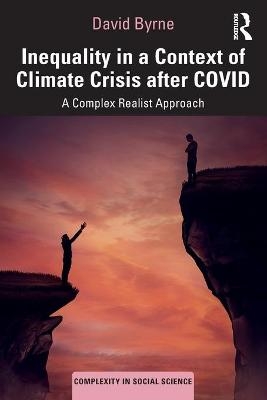
Inequality in a Context of Climate Crisis after COVID
Routledge (Verlag)
978-0-367-46477-6 (ISBN)
Widely acknowledged as the key driver of political discontent and social instability, economic inequality across high and middle-income countries is profoundly interconnected with climate change. Both of these issues are now set within the particularly acute context of COVID-19 and its aftermath. Confronting the crisis of these inherently interwoven issues is now the major problem for all political and governance systems. This book uses a complex realist frame of reference to understand the character of social-cultural-economic-political-ecological systems. It gives us a vocabulary and modes of thinking to confront these societal challenges and inform future action.
Contributing to our thinking about dynamic social systems, this text deploys complex realism to understand our trajectory towards increasing inequality. It puts complexity to work in addressing fundamental social issues in a context of climate crisis after COVID-19. This book will be of interest to students and scholars across the social sciences, in particular to those studying social inequality, climate change, heterodox economics, complex systems, and Master's students in prgrammes with an applied focus. It will be of use to policymakers and practitioners.
David Byrne is Emeritus Professor of Sociology and Applied Social Science at the University of Durham. He has written widely on methodology and inequality deploying the complexity frame of reference to inform all his work over the past twenty-five years. His recent books include Complexity Theory and the Social Sciences – an Introduction (1996), Interpreting Quantitative Data (2002), Social Exclusion (2005), Applying Social Science (2011), Complexity Theory and the Social Sciences: The State of the Art (with Gill Callaghan 2014), Paying for the Welfare State in the 21st Century (with Sally Ruane 2017), and Class after Industry (2019).
1. Inequality: An Issue whose Time has Come
2. Conceptualizing Inequality
3. Describing Inequality
4. Income, Wealth and Inequality
5. Inequality and Capitalism(s) in the 21st Century
6. The Role of the State in Relation to Inequality in a Context of Climate Crisis: How this Works out for Incomes and Wealth
7. The Role of the State in Relation to Inequality in a Context of Climate Crisis: The "Social Wage" and Spatial Planning
8. The Formal Politics of Inequality: What Kind of Governance Systems Do We Need to Confront Inequality in a Context of Climate Change and after COVID
9. The New Politics of Equality
10. The Futures that are Possible for us
| Erscheinungsdatum | 21.06.2021 |
|---|---|
| Reihe/Serie | Complexity in Social Science |
| Zusatzinfo | 3 Tables, black and white; 4 Line drawings, black and white; 4 Illustrations, black and white |
| Verlagsort | London |
| Sprache | englisch |
| Maße | 156 x 234 mm |
| Gewicht | 453 g |
| Themenwelt | Mathematik / Informatik ► Informatik ► Theorie / Studium |
| Recht / Steuern ► Strafrecht ► Kriminologie | |
| Sozialwissenschaften ► Soziologie ► Spezielle Soziologien | |
| Technik ► Umwelttechnik / Biotechnologie | |
| ISBN-10 | 0-367-46477-2 / 0367464772 |
| ISBN-13 | 978-0-367-46477-6 / 9780367464776 |
| Zustand | Neuware |
| Haben Sie eine Frage zum Produkt? |
aus dem Bereich


